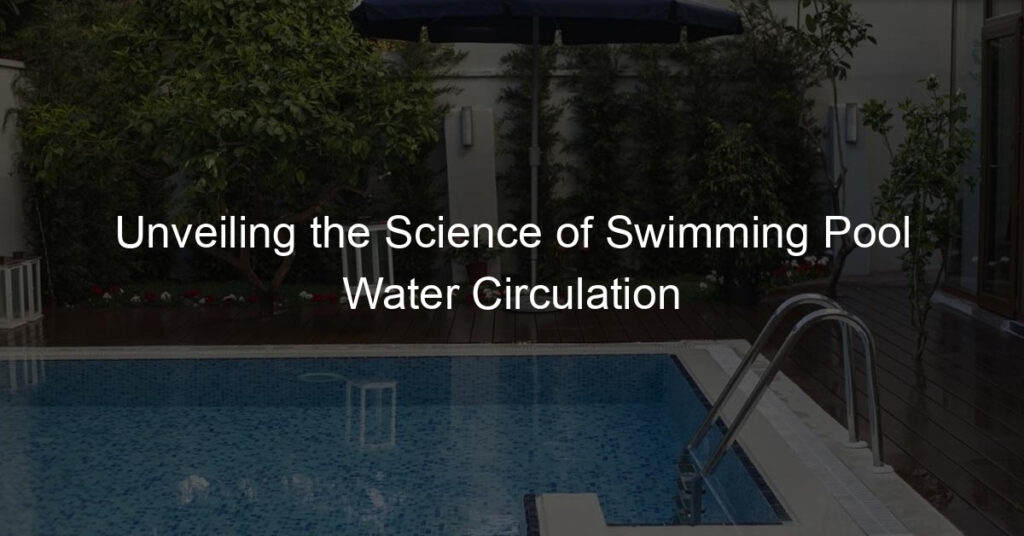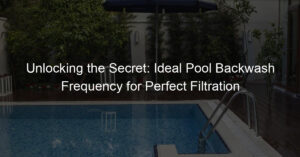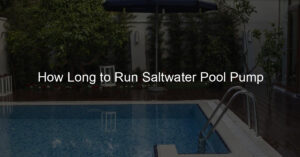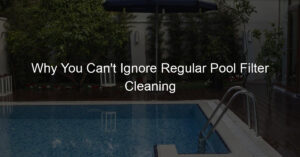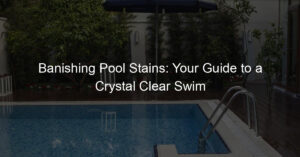Introduction to Pool Water Circulation
Swimming pools are a great way to relax and have fun, especially during the hot summer months. But have you ever wondered how the water in your pool stays clean and clear? The answer lies in the pool water circulation system. In this section, we will explore what pool water circulation is and why it is so important.
-
- Defining Pool Water Circulation
Pool water circulation, in simple terms, is the process of moving the water in your pool around. This is done through a system that includes a pump, filter, and various pipes. The pump pulls the water from the pool, sends it through the filter to remove any dirt or debris, and then pushes it back into the pool. This cycle is repeated several times a day to keep the water clean and safe for swimming.
-
- The Importance of Pool Water Circulation
Pool water circulation is crucial for several reasons. First, it helps to distribute the chemicals evenly throughout the pool, which prevents the growth of harmful bacteria and algae. Second, it aids in the filtration process by moving the water through the filter, where dirt and debris are removed. Lastly, good circulation can help to keep the water temperature consistent, which makes for a more comfortable swimming experience.
In the following sections, we will delve deeper into the science of pool circulation, the components of a pool water circulation system, and how you can improve your pool’s circulation. We will also share a case study to illustrate the pool water circulation process in practice. So, let’s dive in!
Understanding the Science of Pool Circulation
Swimming pools are more than just a place for fun and relaxation. They are a marvel of science, specifically physics and chemistry. In this section, we will delve into the fascinating world of pool water circulation and its science.
The Physics of Pool Water Circulation
Physics plays a crucial role in how water moves in a swimming pool. It’s not just about filling the pool with water and letting it sit. There’s a whole process that ensures the water circulates properly.
-
- How water moves in a swimming pool:
Water movement in a swimming pool is all about circulation. The pool pump pulls water from the pool, sends it through the filter to remove any debris, and then pushes it back into the pool. This cycle keeps the water moving and helps to distribute heat and chemicals evenly throughout the pool.
-
- The role of gravity in pool water movement:
Gravity is another key player in pool water movement. When the pump pushes water back into the pool, gravity pulls it down, creating a flow of water that circulates throughout the pool. This circulation is vital for maintaining a clean and healthy swimming environment.
Understanding the physics of pool water circulation can help you maintain your pool better and ensure it’s always ready for a swim. In the next section, we will discuss the chemical dynamics in pool water circulation, another important aspect of keeping your pool clean and safe.
Chemical Dynamics in Pool Water Circulation
When it comes to pool water circulation, understanding the chemical dynamics is crucial. It’s not just about how the water moves, but also how chemicals are distributed and how water flow impacts their effectiveness. Let’s dive into these topics.
- How chemicals are distributed in the pool
Chemicals play a vital role in keeping pool water clean and safe. When you add chemicals to your pool, they don’t just stay in one place. They move around, thanks to the water circulation. The pool’s pump and filter system help distribute these chemicals evenly throughout the pool. This process is essential because it ensures every part of the pool gets treated, keeping the water balanced and safe for swimming.
- The impact of water flow on chemical effectiveness
The water flow in a pool can significantly affect the effectiveness of the chemicals. If the water flow is too slow, the chemicals might not get distributed evenly, leading to some parts of the pool being over-treated while others are under-treated. On the other hand, if the water flow is too fast, the chemicals might not have enough time to work effectively. Therefore, maintaining a proper water flow is crucial for the chemicals to do their job correctly.
| Chemical | Role | Impact of Water Flow |
|---|---|---|
| Chlorine | Disinfects water by killing bacteria and algae | Uneven water flow can lead to uneven chlorine distribution, causing some areas to have too much chlorine while others have too little |
| pH Adjusters | Helps maintain the pool’s pH level | Improper water flow can cause pH imbalances, leading to issues like cloudy water or irritated skin and eyes |
| Algaecides | Prevents algae growth | Without proper water flow, algaecides might not reach all areas of the pool, allowing algae to grow in untreated areas |
In conclusion, understanding the chemical dynamics in pool water circulation is crucial for maintaining a clean and safe swimming environment. By ensuring proper water flow and even chemical distribution, you can keep your pool in top condition.
Components of a Pool Water Circulation System
One of the key components of a pool water circulation system is the pool pump. Let’s dive into the details of pool pumps and their role in maintaining a clean and healthy swimming pool.
Pool Pumps
Pool pumps play a critical role in the circulation of pool water. They are the heart of the pool’s circulation system, pumping water in and out of the pool to keep it clean and safe for swimming.
- Function of a pool pump in water circulation
The primary function of a pool pump is to circulate the water in the pool. It pulls water from the pool, pushes it through the filter to remove any debris and contaminants, and then pumps the clean water back into the pool. This process helps to keep the pool water clean, clear, and safe for swimmers.
- Choosing the right pool pump
Choosing the right pool pump is crucial for maintaining a healthy pool. The size of your pool, the type of filter system you have, and the amount of use your pool gets are all factors to consider when choosing a pool pump. A larger pool will require a more powerful pump, while a smaller pool can operate effectively with a less powerful pump. Additionally, if your pool gets a lot of use, you may need a pump that can handle the increased demand for water circulation.
Remember, a good pool pump is an investment in the health and safety of your pool. So, take the time to choose the right one for your needs.
Pool Filters
Pool filters play a significant role in maintaining the cleanliness and clarity of your pool water. They are a crucial component of the pool water circulation system. Let’s delve into the role of filters in pool water dynamics and the different types of pool filters available.
- Role of Filters in Pool Water Dynamics
Pool filters are like the kidneys of your pool. They remove impurities from the water, including dirt, leaves, chemical residues, and even bacteria. Without a filter, your pool water would quickly become cloudy and unhygienic.
Filters work in tandem with pool pumps. The pump circulates the water, pushing it through the filter where the impurities are trapped. The clean water is then returned to the pool. This process is vital for maintaining a healthy and safe swimming environment.
- Types of Pool Filters and Their Effectiveness
There are three main types of pool filters: sand filters, cartridge filters, and diatomaceous earth (DE) filters. Each type has its own strengths and weaknesses.
| Filter Type | Effectiveness | Best For |
|---|---|---|
| Sand Filters | Good | Large pools, high usage |
| Cartridge Filters | Very Good | Medium-sized pools, moderate usage |
| DE Filters | Excellent | Small pools, low usage |
Sand filters are the most common and affordable. They are effective at filtering out most impurities, but they require frequent backwashing (cleaning).
Cartridge filters are more efficient than sand filters and require less maintenance. They are a good choice for medium-sized pools.
DE filters offer the highest level of filtration, capable of filtering out particles as small as 5 microns. However, they are more expensive and require more maintenance than the other types.
Choosing the right filter depends on the size of your pool, how often it’s used, and your budget. Remember, a well-functioning filter is key to maintaining clear, clean pool water.
Importance of Pool Water Circulation
Pool water circulation plays a vital role in maintaining a clean and healthy swimming environment. Let’s delve into the health and safety aspects of pool water circulation.
Health and Safety
Ensuring the health and safety of swimmers is a top priority for any pool owner. Proper pool water circulation is instrumental in achieving this goal. Here are two key ways in which pool water circulation contributes to health and safety:
-
- Preventing Waterborne Illnesses
Waterborne illnesses can be a serious concern for swimmers. These illnesses are caused by bacteria and other microorganisms that thrive in stagnant water. A well-circulated pool keeps the water moving and helps to distribute sanitizing chemicals evenly, thereby preventing the growth of harmful bacteria. This significantly reduces the risk of waterborne illnesses.
-
- Maintaining Clear and Clean Water
Clear and clean water is not just visually appealing, but it’s also a sign of a healthy pool. Proper circulation helps to filter out debris and dirt, keeping the water clear. Additionally, it aids in the even distribution of chemicals, ensuring that the water remains clean and safe for swimming.
In conclusion, pool water circulation is crucial for maintaining a safe and healthy swimming environment. It helps prevent waterborne illnesses and keeps the water clean and clear. So, make sure your pool’s circulation system is working efficiently to enjoy a safe and refreshing swim.
Efficiency and Cost-Effectiveness
Efficiency and cost-effectiveness are two critical aspects of pool water circulation. A well-maintained pool water circulation system can significantly reduce energy consumption and extend the lifespan of your pool equipment. Let’s delve into these two points.
- Reducing Energy Consumption
One of the primary benefits of a well-functioning pool water circulation system is its ability to reduce energy consumption. A pool with good water circulation requires less energy to keep the water clean and at the right temperature. This is because the water is evenly distributed, reducing the need for excessive heating or cooling. According to the U.S. Department of Energy, a pool that is well circulated can save up to 60% on energy costs compared to a poorly circulated pool.
- Extending the Lifespan of Pool Equipment
Another significant advantage of an efficient pool water circulation system is the extended lifespan of pool equipment. When the water in your pool circulates properly, it reduces the strain on your pool equipment. This is because the equipment doesn’t have to work as hard to keep the water clean and at the right temperature. As a result, your pool equipment like pumps, filters, and heaters can last longer, saving you money on replacement costs in the long run.
In conclusion, a well-maintained pool water circulation system is not just about keeping the water clean and safe. It’s also about efficiency and cost-effectiveness. By reducing energy consumption and extending the lifespan of your pool equipment, you can save a significant amount of money over time.
Improving Pool Water Circulation
Efficient pool water circulation is vital for maintaining a clean and healthy swimming environment. It helps distribute chemicals evenly, keeps water temperature balanced, and prevents algae growth. Let’s delve into how effective pool design can enhance water circulation.
Effective Pool Design
A well-designed pool can significantly improve water circulation. Two key factors to consider are design elements that enhance water flow and the importance of pool shape and size.
-
- Design Elements That Enhance Water Flow
Strategically placed pool components can greatly enhance water flow. These include:
-
-
- Skimmers: These devices, usually installed at the water’s surface, help circulate water by drawing it in and removing debris.
- Return Jets: Positioned below the water’s surface, these jets push filtered water back into the pool, aiding circulation.
- Main Drains: Located at the bottom of the pool, these drains pull water down, creating a flow that helps circulate water throughout the pool.
- Importance of Pool Shape and Size
-
The shape and size of your pool can significantly impact water circulation. Here’s how:
-
- Pool Shape: Rectangular pools tend to have better circulation because water can flow more easily from one end to the other. Curved or irregular shapes may require additional components to ensure adequate water movement.
- Pool Size: Larger pools may need more powerful pumps or multiple skimmers and return jets to ensure water is circulated effectively.
By considering these design elements and the shape and size of your pool, you can greatly improve your pool’s water circulation, leading to a cleaner, healthier swimming environment.
Regular Maintenance
Keeping your pool in top shape requires regular maintenance, particularly of the pump and filter. This not only ensures a clean and healthy swimming environment but also promotes efficient water circulation. Let’s delve into the importance of regular pump and filter maintenance and how to troubleshoot common circulation issues.
- Importance of Regular Pump and Filter Maintenance
The pump and filter are the heart and lungs of your pool’s circulation system. They work together to keep your pool water clean and clear. The pump circulates the water, while the filter removes debris and contaminants.
Regular maintenance of these components is crucial for several reasons:
- Efficiency: A well-maintained pump and filter operate more efficiently, saving you money on energy costs.
- Longevity: Regular maintenance can extend the lifespan of your pump and filter, preventing costly replacements.
- Water Quality: Clean filters and pumps ensure your pool water remains clear and free from harmful bacteria and algae.
- How to Troubleshoot Common Circulation Issues
Even with regular maintenance, you may encounter circulation issues. Here are some common problems and how to troubleshoot them:
| Issue | Solution |
|---|---|
| Low Water Flow | Check for clogs in the pump or filter. If none are found, you may need to increase the pump’s speed or size. |
| Cloudy Water | Check the filter for debris. If it’s clean, test the water’s chemical balance. You may need to adjust the chlorine or pH levels. |
| Uneven Heating | Ensure the return jets are positioned correctly. They should be pointing downwards and in the same direction to promote even water circulation. |
Remember, regular maintenance and troubleshooting are key to maintaining optimal pool water circulation. When in doubt, consult with a pool professional to ensure your pool remains a safe and enjoyable space.
Case Study: Pool Water Circulation Process in Practice
Let’s dive into a real-world example to better understand the importance of pool water circulation. We’ll explore a case study of a well-circulated pool and discuss the lessons learned and key takeaways.
- Real-world example of a well-circulated pool
Consider the case of the Olympic-sized pool at the local community center. This pool is known for its crystal-clear water and is a favorite among swimmers. The secret behind its success? A well-maintained and efficient pool water circulation system.
The pool uses a combination of skimmers, drains, and return jets to ensure water is constantly moving. The skimmers remove debris from the surface, the main drain pulls water from the bottom, and the return jets push clean, filtered water back into the pool. This continuous cycle keeps the water clean, clear, and safe for swimmers.
The pool’s circulation system is checked and maintained regularly. The pumps and filters are cleaned, and the water chemistry is tested daily. This attention to detail ensures the pool water remains in top condition.
- Lessons learned and key takeaways
What can we learn from this case study? The importance of a well-circulated pool cannot be overstated. Here are some key takeaways:
- Regular Maintenance: Regular checks and maintenance of the pool’s circulation system are crucial. This includes cleaning the pumps and filters and testing the water chemistry.
- Proper Equipment: Having the right equipment, such as skimmers, drains, and return jets, is essential for effective water circulation.
- Continuous Circulation: Keeping the water moving continuously helps to keep it clean and clear. It prevents the buildup of debris and bacteria, ensuring a safe swimming environment.
In conclusion, a well-circulated pool is the key to clean, clear, and safe water. By understanding and implementing effective pool water circulation practices, we can enjoy a better swimming experience.
Conclusion: Understanding Pool Water Circulation
In this article, we have delved deep into the world of pool water circulation. We have explored its science, its components, and its importance. Let’s take a moment to recap and reflect on what we have learned.
-
- Recap of the science of pool circulation
The science of pool circulation is all about ensuring that water is continuously moving and filtering. This process involves the pool pump, which pulls water from the pool, sends it through the filter to remove any debris, and then returns it back to the pool. This cycle helps to distribute chemicals evenly and keep the water clean and safe.
-
- Final thoughts on the importance of pool water movement
Pool water movement is not just about keeping the water clean. It also plays a crucial role in maintaining the overall health of your pool. Proper circulation prevents the growth of algae and bacteria, reduces the chance of cloudy water, and helps to distribute heat evenly. In essence, good pool water circulation is key to a healthy and enjoyable swimming experience.
In conclusion, understanding pool water circulation is essential for any pool owner. It’s not just about having a sparkling clean pool, but also about ensuring the longevity of your pool and the safety of those who use it. Remember, a well-circulated pool is a happy pool!

